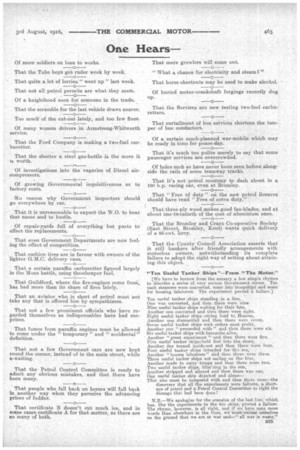One Hears— Of more soldiers on loan to works.
Page 5

If you've noticed an error in this article please click here to report it so we can fix it.
That the Tube boys get ruder week by week.
That quite a lot of lorries "went up" last week.
That not all petrol permits are what they seem.
Of a knighthood soon for someone in the trade.
That the scramble for the last vehicle draws nearer.
Tao much' of the cut-out lately, and too few fines.
Of many women drivers in Armstrong-Whitworth service.
That the Ford Company is making a two-fuel carburetter.
That the shorter a steel gas-bottle is the more it is worth.
• Of investigations into the vagaries of Diesel aircompressots.
Of growing Governmental inquisitiveoess as to factory costs.
'Na reason why Government inspectors should go everywhere by car.
• That it is unreasonable to expect the W.O. to bear that name and to bustle.
Of repair-yards full of everything but parts to effect the replacements.
That even Government Departments are frig the effect of competition. now feel , That cushion tires are in favour with owners of the lighter G.M.C. delivery vans.
That a certain paraffin carburetter figured largely in the Mons battle, using the.icheaper fuel.
That Guildford, where the fire-engines come froni, has had more than its share of fires lately.
That an aviator who is short of petrol must not take any that is offered him by sympathizers.
That not a few prominent officials who have regarded themselves as indispensables have had surprises.
That fumes from paraffin engines must be allowed to come under the "temporary" and " accidental" definition.
That not a, few Government cars are now kept round the corner, instead of in the main street, while a-waiting.
That the Petrol Control Committee is ready to admit any obvious mistakes, and that there have been many.
That people who fall back on horses will fall back in another way when they perceive the advancing prices of fodder.
That certificate B doesn't cut much ice, and in some ca,ses certificate A for that matter, as there are so many of both. That more growlers will come out.
"What a chance for electricity and steam I" That horse-chestnuts may be used to make alcohol.
Of buried motor-crankshaft forgings recently dug up.
That the Services are now testing two-fuel carburetters.
That curtailment of bus services shortens the temper of bus conductors.
Of a certain much-planned war-mobile which may be ready in time for peace-day.
That it's much too polite merely, to say that some passenger services are overcrowded.
Of holes such as have never been seen before alongside the rails of sonic tramway tracks.
That it's not petrol economy to dash about in a 100 h.p. racing car, even at Bromley.
That "Free of duty" on the new petrol licences should have read " Free of extra duty."
That three-ply wood makes.good fan-blades, and at about one-twentieth of the cost of aluminium ones.
That the Bromley and Crays Co-operative Society (East Street, Bromley, Kent) wants quick delivery of a 25-cwt. lorry.
That the County Council Association asserts that it still hankers after friendly arrangements with motorbus owners, notwithstanding its complete failure to adapt the right way of setting about attaining this object.
"Ten Useful Tanker Ships"—From "The Motor."
[We have to borrow from the nursery a few simple rhymes to describe a series of very serious Government errors. Ten tank steamers were converted, some into troopshipi and some for housing laboUrers. The experinient proved a failure.] Ten useful tanker ships standing in a line, One was converted, and then there were nine Nine useful tanker ships waiting for their fate, Another one converted and then there were eight. Eight useful tanker ships crying loud to Heaven, Another one dismantled and then there were seven.: Seven 'useful tanker ships wait orders most prolix, Another one " proceeded with" and then there were six. Six useful tanker ships with barnacles alive,
• Another "great experiment " and then there were five. Five useful tanker ships held fast into the shore. Another one turned inside-out and then there were four, Four useful tanker ships intended for tho sea, Another "houses labourers" and then there were three. Three useful tanker ships not sailing on the blue, Another made to carry troops and then there were two. Two useful tanker ships, blisCring in the sun, Another stripped and altered and then there was 01-10. One useful tanker ship dejected and alone—
That also must be tampered with and then there were—the discoverythat all the experiments were failures, a short. age of petrol and a Petrol Control Committee to right the damage that had been done !
NB.—We apologize for the scansion of the last line, which has, like the experiments to the ten ships; proved a failure. The rhyme, however, is all right, and if we have nsen more words than elsewhere in the lines, we•inust•exense ourselves on the ground that we are at war and—" all war is waste."




















